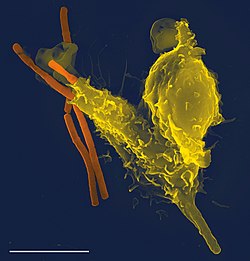Informatics Educational Institutions & Programs
The systems science portal
 |
| Complex systems approach |
Systems science is an transdisciplinary[1] field that studies the nature of systems—from simple to complex—in nature, society, cognition, engineering, technology and science itself. To systems scientists, the world can be understood as a system of systems. The field aims to develop interdisciplinary foundations that are applicable in a variety of areas, such as psychology, biology, medicine, communication, business management, engineering, and social sciences.
Systems science covers formal sciences such as complex systems, cybernetics, dynamical systems theory, information theory, linguistics or systems theory. It has applications in the field of the natural and social sciences and engineering, such as control theory, operations research, social systems theory, systems biology, system dynamics, human factors, systems ecology, systems engineering and systems psychology. Themes commonly stressed in system science are (a) holistic view, (b) interaction between a system and its embedding environment, and (c) complex (often subtle) trajectories of dynamic behavior that sometimes are stable (and thus reinforcing), while at various 'boundary conditions' can become wildly unstable (and thus destructive). Concerns about Earth-scale biosphere/geosphere dynamics is an example of the nature of problems to which systems science seeks to contribute meaningful insights.
Selected article -

The immune system is a network of biological systems that protects an organism from diseases. It detects and responds to a wide variety of pathogens, from viruses to parasitic worms, as well as cancer cells and objects such as wood splinters, distinguishing them from the organism's own healthy tissue. Many species have two major subsystems of the immune system. The innate immune system provides a preconfigured response to broad groups of situations and stimuli. The adaptive immune system provides a tailored response to each stimulus by learning to recognize molecules it has previously encountered. Both use molecules and cells to perform their functions.
Nearly all organisms have some kind of immune system. Bacteria have a rudimentary immune system in the form of enzymes that protect against viral infections. Other basic immune mechanisms evolved in ancient plants and animals and remain in their modern descendants. These mechanisms include phagocytosis, antimicrobial peptides called defensins, and the complement system. Jawed vertebrates, including humans, have even more sophisticated defense mechanisms, including the ability to adapt to recognize pathogens more efficiently. Adaptive (or acquired) immunity creates an immunological memory leading to an enhanced response to subsequent encounters with that same pathogen. This process of acquired immunity is the basis of vaccination. (Full article...)Selected picture

An ecological analysis of CO-2 in an ecosystem. As systems biology, systems ecology seeks a holistic view of the interactions and transactions within and between biological and ecological systems.
'WikiProjects
Selected biography -
Joseph Francis Shea (September 5, 1925 – February 14, 1999) was an American aerospace engineer and NASA manager. Born in the New York City borough of the Bronx, he was educated at the University of Michigan, receiving a Ph.D. in Engineering Mechanics in 1955. After working for Bell Labs on the radio inertial guidance system of the Titan I intercontinental ballistic missile, he was hired by NASA in 1961. As Deputy Director of NASA's Office of Manned Space Flight, and later as head of the Apollo Spacecraft Program Office, Shea played a key role in shaping the course of the Apollo program, helping to lead NASA to the decision in favor of lunar orbit rendezvous and supporting "all up" testing of the Saturn V rocket. While sometimes causing controversy within the agency, Shea was remembered by his former colleague George Mueller as "one of the greatest systems engineers of our time".
Deeply involved in the investigation of the 1967 Apollo 1 fire, Shea suffered from stress. He was moved to an alternative position in Washington and left NASA shortly afterwards. From 1968 until 1990 he worked as a senior manager at Raytheon in Lexington, Massachusetts, and thereafter became an adjunct professor of aeronautics and astronautics at MIT. While Shea served as a consultant for NASA on the redesign of the International Space Station in 1993, he was forced to resign from the position due to health issues. (Full article...)Did you know
- ... that a successful experimental system must be stable and reproducible enough for scientists to make sense of the system's behavior, but unpredictable enough that it can produce useful results?
- ... that the Yugoslavian Mihajlo D. Mesarovic in 1970s wanted to provide a unified and formalized mathematical approach to all major systems concepts.
- ... that a multi-agent system (MAS) is a system composed of multiple interacting intelligent agents, which can be used to solve problems which are impossible for monolithic system to solve.
- ... that American systems theorist Debora Hammond in the new millennium explores new ways of thinking about complex systems that support more participatory forms of social organization?
Categories
Related portals
Topics
Tasks
 |
Here are some tasks awaiting attention:
|
Associated Wikimedia
-

-

-

-

-
Random portal



























